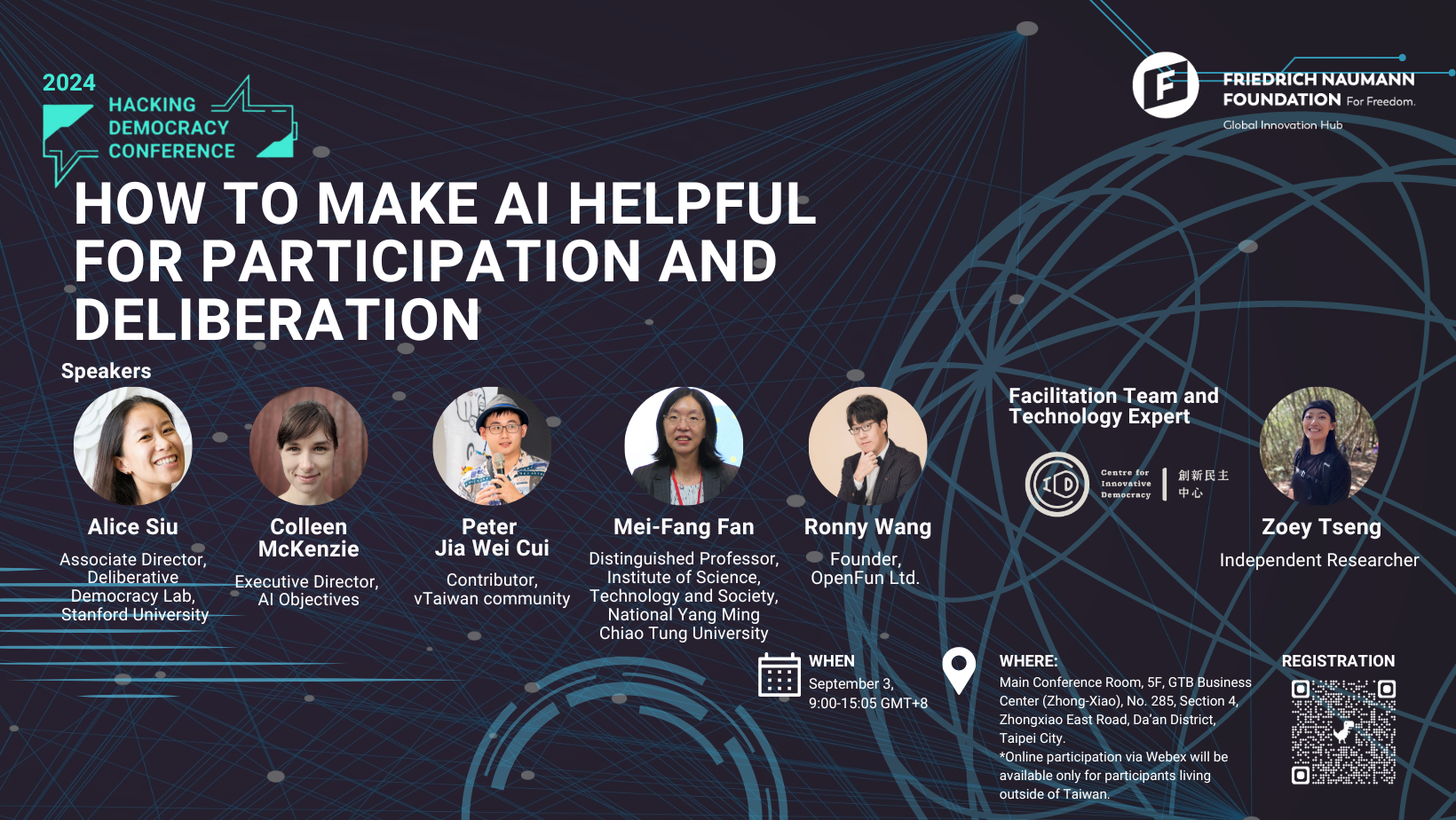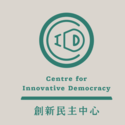Event
2024 Hacking Democracy Conference: How to Make AI Helpful for Participation and Deliberation

FNF Global Innovation Hub will hold our annual Hacking Democracy Conference on September 3, 9:00-15:05 GMT+8 in Taipei in a hybrid format. If you are practitioners in participatory and deliberative democracy, come register by clicking here before August 20, 2024!
What is Hacking Democracy Conference
FNF’s Hacking Democracy Conference’s goal is to inspire discussion on how to innovate approaches to challenge traditional methods of enhancing democracy. That does not mean this conference aims to overthrow all those traditional manners. We want to encourage people to try innovative approaches and to debate whether they can be helpful for democracy. By doing so, we enable the power of innovation to complement the traditional approaches, and thereby to continuously rejuvenate democracy. Click here and here for our previous Conferences in 2022 and 2023.
The Conference for 2024: How to Make AI Helpful for Participation and Deliberation
Artificial Intelligence (AI)’s applications are now applied everywhere in our life. Particularly, they are known for their features of summarizing numerous texts and generating replies according to users' expectation in a short time. Such features inspire people to think that maybe AI can be helpful for enhancing participation and deliberation. AI may help us to cope with the limitation of time, space, language barrier, and transparency during a discussion. Therefore, AI tools for deliberation and participation are increasingly invented. For example, Talk to the City from AI Objectives Institute and Online Deliberation Platform from Stanford’s Center for Deliberative Democracy and Crowdsourced Democracy Team can be two very inspiring inventions among them, and there are definitely more inventions as such in the world that wait for us to discover.
The inventions of these AI tools trigger the curiosity of FNF Global Innovation Hub to discover whether AI can really foster democracy by asking advocates and practitioners to learn and try these tools. We want to do so because, although there are already many deliberations done by using these tools, we found the feedback of the practitioners and advocates for participatory and deliberative democracy are less visible, and perhaps not many of them learn about these tools. However, they are those who are leading many deliberations and discussions at the front line, such as in our communities, our town hall meetings, citizen assemblies, and any discussion of public policies. It’s important to know whether these AI tools can meet the needs of advocates and practitioners of participatory and deliberative democracy.
Designing and facilitating a deliberation that checks all the boxes of an ideal participatory democracy is their expertise. Also, such expertise can be a framework for us to check how much these AI tools can help on deliberations and participation. For example, their facilitation skills—observing participants’ reaction and emotion and thereby know how to facilitate the discussion— can help us check whether AI tools are also taking care of that part.
Therefore, in this Conference, we hope we can discover and facilitate participants’ understanding of:
- What AI tools for deliberation and participation exist in the world?
- Whether they are helpful to participation and deliberations?
- What can they help; while what cannot; and how can they be improved?
- How should practitioners of deliberative and participatory democracy perceive AI tools? What knowledge on AI do they need to know?
- If we can imagine freely, or temporarily put AI aside, what technology assistance do practitioners of deliberative and participatory democracy hope to have?
What We Plan to Achieve
We hope to collect, summarize, and publish speakers and participants’ input in this Conference for and in our What Kind of AI and Technologies Do We Need for Democracy publication, and publish the video of a part of the Conference.
Meet Our Speakers, Technology Experts, and Facilitators
Alice Siu, Associate Director, Deliberative Democracy Lab, Stanford University
Alice Siu is Associate Director of the Deliberative Democracy Lab and Senior Research Scholar at the Center for Democracy, Development, and Rule of Law housed at the Freeman Spogli Institute at Stanford University. She received her Ph.D. from the Department of Communication at Stanford University, with a focus in political communication, deliberative democracy, and public opinion, and her B.A. degrees in Economics and Public Policy and M.A. degree in Political Science, also from Stanford. She is a lead collaborator on the Stanford Online Deliberation Platform, a partnership with the Crowdsourced Democracy Team at Stanford. On Deliberative Polling, she has advised policymakers and political leaders around the world, at various levels of government, including in Mongolia, China, and Brazil. Her research interests in deliberative democracy include what happens inside deliberation, such as examining the effects of socio-economic class in deliberation, the quality of deliberation, and the quality of arguments in deliberation.

Colleen McKenzie, Executive Director, AI Objectives
Colleen is a researcher, designer, and product strategist, interested in exploring and improving humans' interaction with technology in a variety of contexts. As Executive Director of the AI Objectives Institute, a nonprofit research lab, she directs the institute's overall research program for using AI in support of collective and individual human agency. Previously, Colleen co-founded the Median Group, a scientific research nonprofit, where she explored technological trends and their societal impacts. Other past roles include PM and SWE at Google, and Chief of Staff at the Center for Humane Technology. She holds a B.A. in Computer Science and Neuroscience from Columbia University.

Peter Jia Wei Cui, Contributor of vTaiwan community
Peter Jia Wei Cui is currently a law student in National Taiwan University, studying technology law and financial regulation. Besides his study, he participated g0v and vTaiwan community as a contributor. In 2023, he and vTaiwan folks won the OpenAI grant of Democratic Input to AI as 10 teams out of 800 teams around the world.

Mei-Fang Fan, Distinguished Professor, Institute of Science, Technology and Society, National Yang Ming Chiao Tung University
Mei-Fang Fan is Distinguished Professor at the Institute of Science, Technology and Society, National Yang Ming Chiao Tung University and Associate Editor of Environmental Science & Policy. She holds a doctoral degree in Environment and Society from Lancaster University. Research interests include environmental politics, deliberative democracy, public participation and risk governance. She is the author of Deliberative Democracy in Taiwan: A Deliberative Systems Perspective (Routledge, 2021). She has published articles in venues including Public Understanding of Science, Environment and Planning C: Politics and Space; Environmental Politics. Her team has conducted numerous deliberative forums and participatory budgeting residents’ assembly and collaborated with Deliberative Democracy Lab at Stanford University conducting deliberative polls on Taiwan’s 2050 Net-Zero Pathway, Responsible AI Innovation, Using AI to Enhance Information Integrity.

Ronny Wang, Founder of OpenFun Ltd.
Ronny Wang, the founder of OpenFun Ltd., has been involved in the open government and open parliament movements for many years. He enjoys writing web scraping programs to collect government data and convert it into open data or open APIs for public use. Within the g0v.tw community, he has initiated numerous civic technology projects. For example, he launched the Open Campaign Finance project, which uses crowdsourcing to convert political donation data, only available in paper form by the government, into digital data and advocates for the government to publish this data online. He also started the Job Helper project, a browser extension that shows whether a company has a history of labor law violations while you are browsing job websites. Additionally, he initiated the Taiwan Parliament API project, which transforms various unstructured Word and PDF documents from the Legislative Yuan into structured data, aiming to help more people understand the workings of the parliament. For more related projects and works, visit https://ronny.tw/data or https://openfun.tw/.

Zoey Tseng, Independent Researcher
Zoey Tseng is an independent researcher specializing in public goods and self-sovereign identity. Actively involved in the g0v community, Tseng conducted research on designing a new government funding mechanism for open-source projects. Tseng's collaborations extend to Taiwan's Ministry of Digital Affairs (MoDA), where she has participated in web3 and AI-related projects. Notably, she played a key role in deploying Talk to the City for MoDA. Beyond research and development, Tseng has facilitated several deliberation workshops in Taiwan, fostering discussions on the impact and development of large language models (LLMs).

Facilitation Team: The Centre for Innovative Democracy (CID)
The Centre for Innovative Democracy (CID) focuses on curating new participatory practices to engage stakeholders and the public in deliberation about public issues. Our mission is to develop good deliberative frameworks that have the potential to address important issues, improve governance, and support policy development.

Agenda (Tentative)
9:00-10:05 am Introducing Existing AI Deliberation and Participation Tools
- Alice Siu, Associate Director, Deliberative Democracy Lab
- Colleen McKenzie, Executive Director, AI Objectives
- Ronny Wang, Founder, Openfun.tw
10:05-10:55 am Test these AI tools
*Participants will be invited to test these AI deliberation tools by being divided into groups to have a simulation deliberation on a public policy by using these tools. Our experts and facilitators will help you to navigate these tools.
10:05-10:35 Test Online Democracy Forum
10:35-10:55 Test Talk to the City
10:55-11:25 am. QA session: How these AI tool work
*After testing these tools. Participants may still have technical questions on how these AI tool work. They can ask questions to the tech experts. Our expert will also offer you a basic knowledge about these AI tools.
- Céline Nauer, Project Advisor, FNF Global Innovation Hub
- Zoey Tzeng, Product Manager, Talk to the City
11:25-12:05 am Discussion: How Do You Feel About these AI tools
Participants will be offered a framework to discuss what they think about these tools. For example, in terms of accessibility, are these tools easy to access for everyone or too difficult to operate? These will help us to figure out what these tools can help, what cannot, and what can be improved. Participants are free to add new aspects in the framework or freely share their feedback.
12:05-12:40 Lunch Break
12:40-13:00 Presentations of Each Group
13:05-13:55 Experience of Using AI tools for Facilitation
- Prof. Mei-fang Fan, Institute of Science, Technology and Society, National Yang Ming Chiao Tung University (15 mins)
- Peter Cui, Contributor of v Taiwan (15 mins)
13:55-14:35 Imagine Freely What Technologies We Need to Facilitate Participation and Deliberation?
*Participants will be offered a framework to share and discuss. If we temporarily put AI aside or pretend today’s discussion is not just about AI, what kind of technology tools do they hope technology experts will develop to solve the problem they encounter when operating a deliberation? For example, maybe they hope there can be a technology that enables people who speak different languages to easily participate in discussion? This will help us, and particularly technology experts, to know what kind of ideal technology tools do democracy advocates really need. Participants are free to add new aspects in the framework or freely share their feedback.
14:35-15:05 Presentation of Participants
*Every Group will present their discussion of the two sessions.
15:05-15:35 I still have questions on AI tools and AI
15:35-15:40 Conclusion
Who Should Register
- Since we need to limit the number of participants due the facilitator’s capacity of leading the discussion to around 15 participants in total, we will prioritize participants who are practitioners or advocates for deliberative and participation, or who have tried using AI or technologies for participation or deliberations.
- Due budget constraints, accepted participants living outside of Taiwan will attend online via Webex; participants living in Taiwan are required to attend it on-site, and the venue is the Main Conference Room, 5F, GTB Business Center (Zhong-Xiao), No. 285, Section 4, Zhongxiao East Road, Da’an District, Taipei City.
- Due to budget constraints, participants in Taiwan are required to participate in the whole session; participants living outside Taiwan can just participate for half part of this conference or to the extent that their time zone can accommodate.
- English and Mandarin will be used in this conference, and we offer Mandarin-English two-way simultaneous interpretation.
How to Register?
Before registration, please read the following notice:
- Deadline of registration: August 20, 2024, 12:00pm, UTC+8. FNF will also close registration when we have a full number of qualified participants. Please register as early as possible.
- Since this conference has its target audience and requires a certain level of knowledge and experience of participatory democracy, we will review the applications to decide whether to accept a participant, and we will prioritize people who have experience in participatory democracy or deliberative democracy. Registration doesn’t mean acceptance. Only people who receive acceptance confirmation emails will be allowed to participate. Please check your email inbox after registration.
- Please note that participants who fail to register on time or maliciously provide wrong or fake information will not be accepted by FNF.
- Participants have to understand and agree that FNF will anonymously collect, compile, edit, summarize, and publish participants’ input of ideas during the Conference, including but not limited to their input during discussion, questions, or opinion expressed, for and in FNF’s “What Kind of AI and Technologies Do We Need for Democracy” Publication. And participants need to agree to follow the Chatham House Rule.
- We need your cellphone number to allow you and other participants to operate the video recording function of Talk To The City, one of the AI tools that you and we will test during our Conference from 10:00 to 10:45am. The discussion of the testing session will not be collected and published. We and TttC promise to delete it after the end of the Conference and will use it for purposes other than this Conference.
- Should you have any question, please send an e-mail to ywc777@proton.me
- Please click here to fill in the registration form before August 20
